In this article:
Air pollution is the contamination of outdoor and indoor air by chemical, physical, or biological substances that poses harmful effects.

Pollutants refer to the agents that are responsible for causing pollution; they change the natural aspects of the atmosphere. More than 90% of people experience day-to-day pollution worldwide.
Air pollution has been shown to be related to increased chances of worsening or causing common skin diseases such as acne. Therefore, it is important to think of air pollution as a risk factor for unhealthy skin.
Thus, you must know how to protect your skin from pollution to mitigate its negative effects. (1)
Ways to Treat Dull and Dark Skin Due to Pollution
The first and most important thing is preventing skin damage by pollution by covering the face with a mask and wearing protective agents.
Additionally, here are a few methods to treat skin damage due to pollution.
1. Maintain proper hydration
Water has numerous roles in the body. It serves as a building material, a solvent, and a reaction medium, among other functions.
The most crucial role of water is to act as a transporter for both nutrients and waste products. (2)
Without adequate water intake, skin appears duller, wrinkles and open pores are more prominent. Proper hydration levels help the skin to become plump and improve its elasticity meaning it’s less likely to crack and have irritations and blemishes. (3)
The advised daily water intake for adults is 2 L or 0.5 gallons per day. (1)(2)
2. Follow the right diet
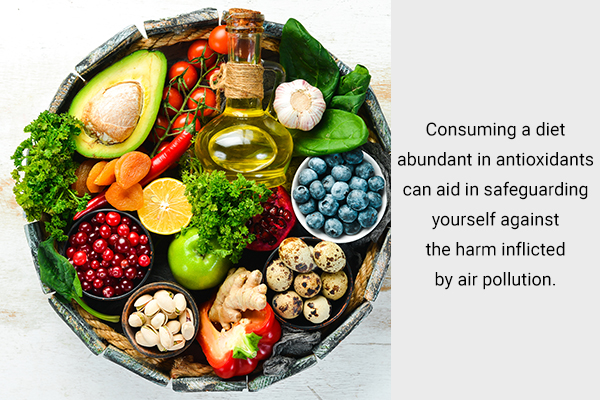
Free radicals are unstable molecules that are hazardous for the skin because they can cause inflammation and are hypothesized to cause a number of chronic disorders due to the oxidative stress they induce.
Oxidative stress in the skin plays a significant part in the aging process. Antioxidants, as the name suggests, neutralize the free radicals produced by harmful air pollutants that enter the body. Hence, consuming a diet abundant in antioxidants can aid in safeguarding yourself against the harm inflicted by air pollution. (4)
The most significant antioxidant supplements are: (5)
- Vitamin B3
- Vitamin E
- Selenium
- Vitamin C
- Omega-3 fatty acids
- β-carotene
- Green tea
Foods with a high content of antioxidants are:
- Fruits
- Fish
- Legumes
- Vegetables
- Whole grains
- Poultry
- Olive oil
A Mediterranean diet is said to be a diet rich in antioxidants.
According to a study conducted by the New York University School of Medicine, individuals who had prolonged exposure to air pollution and followed a Mediterranean-like diet experienced fewer chronic health problems than those who did not. These findings suggest the importance of consuming a diet rich in antioxidants to shield the skin against pollution-induced damage, although further research is necessary. (6)(7)
3. Observe an antipollution skin care regimen
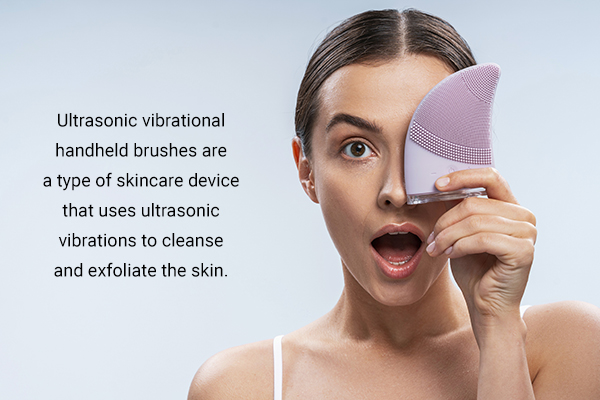
Cleansing the skin is the best part of an antipollution skin regimen. Air pollutants can attach to the skin and impair the skin barrier, making it prone to:
Studies have indicated improved skin cleansing with the use of ultrasonic vibrational handheld brushes. (1)(8)
Ultrasonic vibrational handheld brushes
Ultrasonic vibrational handheld brushes are skin care devices that use ultrasonic vibrations to cleanse and exfoliate the skin. These devices typically have a small brush head that vibrates at a high frequency, creating tiny waves of energy that help to remove dirt, oil, and dead skin cells from the surface of the skin.
To use them:
- Choose the right brush head for your skin type. Some brushes come with multiple brush heads, so make sure to choose the one that is best for your skin.
- Rinse your skin and the head of the brush with clean water. Apply your favorite cleanser to the brush head or directly to your skin.
- Turn the brush on and use it in circular movements over your skin, avoiding the delicate eye area. Don’t apply too much pressure; let the vibrations do the work for you.
- Use the brush for about 1–2 minutes, depending on your skin’s sensitivity. Wash your face with water and gently dry it with a clean cloth.
- You can use the brush once a day or a couple times for a week, based on your skin’s needs. If your skin is sensitive, use the brush less frequently.
- After using the brush, make sure to wash it nicely and let it dry before storing it.
Furthermore, it is crucial to meticulously adhere to the manufacturer’s guidelines and frequently sanitize the brush head to prevent the proliferation of bacteria. (1)(8)
4. Wear sunscreen
Protecting the skin during the day with sunscreen is also a vital part of skin care. It is advised to implement a twice-daily skin care regimen, starting with a cleanse every time. (9)
5. Follow a good morning regimen
The morning cleanse is important to prepare the face for the expected environmental impacts such as those of air pollution. A skin care regimen is important to safeguard the skin from pollutants.
People who have acne-prone skin should use medically advised products to prevent any flare-ups.
The recommended skin care regimen involves the following steps:
- Use a gentle face wash to cleanse your face.
- Apply either witch hazel or an alcohol-based toner/serum to aid in the closure of your pores. (1)
- Apply a silicone-based moisturizer, which plays the role of an additional barrier to protect the skin.
- Apply a broad-spectrum sunscreen that shields against all UV wavelengths and infrared radiation. (1)
6. Follow a nighttime regimen too
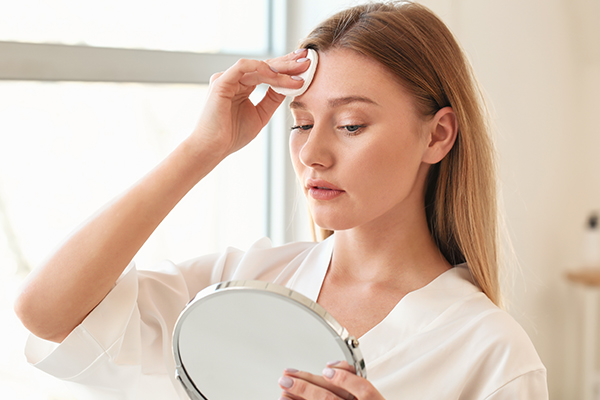
The evening cleanse is important to expel pollutants including airborne particles, soot (the black powder that forms when things burn, such as when a candle or a car engine burns fuel), and other skin contaminants.
The evening skin care regimen can involve the following steps: (1)
- Remove all your makeup.
- Cleanse your face with a handheld sonic/vibrational cleansing device or cleanse properly using a washcloth.
- Apply a moisturizer with ingredients such as DNA repair enzymes, resveratrol, and retinoids.
DNA repair creams
Exposure to ultraviolet radiation (UVR) is a significant risk element for skin aging, which encompasses the emergence of fine lines, wrinkles, and age spots. Moreover, UVR exposure can cause damage to the skin’s DNA, leading to skin cancer development.
A DNA repair cream is a topical product that contains DNA repair enzymes that help to repair DNA damage caused by UVR exposure. The use of this cream can help to reduce the risk of developing skin cancer and can promote healthy, youthful-looking skin. (1)(10)
Resveratrol
Resveratrol is a popular ingredient in cosmeceuticals due to its proven ability to penetrate the skin barrier and its reported antiaging properties.
One of the primary benefits of resveratrol for the skin is its ability to stimulate the proliferation of fibroblasts. Fibroblasts are responsible for generating collagen, a protein that endows the skin with elasticity and structure.
It has been revealed that resveratrol can impede melanogenesis, the process of producing melanin in the skin. Melanin is responsible for the color of the skin, and an overproduction of melanin can lead to the development of hyperpigmentation, such as age spots and sunspots. (1)(11)(12)
Retinoids
Retinoids have been demonstrated to be one of the most efficacious substances for decelerating the skin’s aging process. They can make better the appearance of age spots, fine lines, and/or wrinkles.
Overall, retinoids are a very useful ingredient for enhancing the build of aging skin. They work by regulating cellular processes, promoting keratinocyte proliferation, protecting collagen, and inhibiting metalloproteinases.
While they can be irritating and require some adjustment, the benefits of using retinoids for skin care are well worth it. (1)(13)
Know the Right Way to Use Skin Care Products
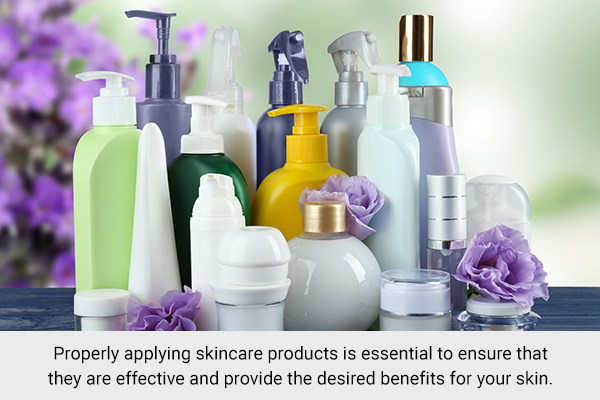
Properly applying skin care products ensures their effectiveness and benefits on your skin. It is crucial to begin with a clean slate before using any skin care product. Use a mild cleanser to eliminate dirt, oil, and makeup from your skin.
To maximize the effectiveness of your skin care products, it is crucial to apply them in the correct order. As a general guideline, apply products in order of their consistency, starting with the thinnest and moving on to the thickest. This permits each product to be absorbed fully before the subsequent one is applied.
1. Start with toner
If you use toner as part of your skin care routine, apply it first. Toners aid in balancing the pH level of the skin and make it ready for the next steps.
2. Apply serums
Serums are light formulas and have an elevated concentration of active components. Apply your serum of choice after the toner to provide strong beneficial components to your skin.
3. Apply an eye cream
The area around your eyes is soft and needs particular care. Apply a tiny quantity of eye cream to the under-eye region, using your ring finger to gently pat it in.
4. Moisturize
Moisturizers hydrate and protect the skin and should be applied after serums and eye creams. Spread a small amount of moisturizer to your face and also the neck and chest using upward and outward strokes.
5. Apply sunscreen
Sunscreen is essential to safeguard your skin from the damaging ultraviolet rays. Apply a broad-spectrum sunscreen as the finishing stage of your daytime skin care routine.
Remember to give each product time to soak up completely into your skin before using the subsequent one. This will enable every product to be effective and to deliver the maximum benefits to your skin.
How Pollution Enters the Skin
Studies show that pollutants enter the skin by: (14)
- Direct assemblage on the skin
- Inhalation
- Absorption through the hair follicles
- Ingestion
- Circulation of pollutants in the plasma
Note: Absorption via the hair follicles and sweat ducts is the briefest path.
Most-Asked Questions
What skin disorders are caused by pollution?
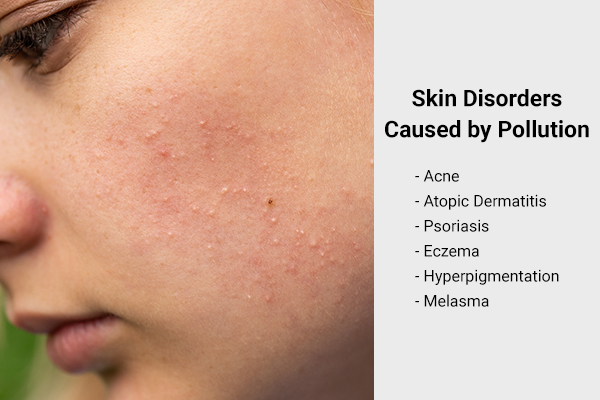
Skin disorders caused by pollution include:
- Acne
- Atopic dermatitis
- Psoriasis
- Eczema
- Hyperpigmentation
- Melasma
Can pollution make my acne worse?
Yes. There’s strong evidence indicating a relationship between pollution and inflammatory acne. In one study, a decline in skin quality was observed with chronic exposure to pollution. (15)
Can eczema worsen due to pollution?
Research shows that there is a rising prevalence of eczema or atopic dermatitis with an international increase in urbanization and increasing air pollution. (16)
Final Word
Pollution has been shown to play a major role in deterviorating skin health as it affects the skin negatively, causing a variety of disorders.
Following antipollution dietary and skin care routines can promote healthy and clear skin and can mitigate the development of pollution-related skin disorders.
- Was this article helpful?
- YES, THANKS!NOT REALLY


